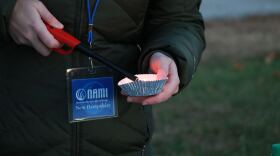A new state report documents systemic neglect and abuse at a residential facility for people with disabilities in Effingham.
Now the state will determine if the facility can keep its doors open. But the state may simply be ill-equipped to stop these kinds of problems before they happen.
Karen Rosenberg is an attorney with the Disability Rights Center. The report her organization issued in September documents the case of a 22-year-old man nicknamed “J.D.” J.D entered Lakeview Neurorehabilitation Center in 2012, and Rosenberg says once admitted, his health declined precipitously.
"He stopped eating. He wasn’t taking his medications regularly. He lost almost 47 pounds. Yet the staff at Lakeview really didn’t pay attention to what were signs of a significant health problem," she says.
One morning 72 days after he was admitted, two staff members in two separate instances noticed J.D. was nonresponsive. But they didn’t notify anyone or ask for assistance. A couple hours later, J.D. was naked in a puddle of urine, and likely already dead.
When the DRC report was issued in September, Governor Maggie Hassan directed the Department of Health and Human Services to conduct a review.
HHS Deputy Commissioner Marilee Nihan says the state report confirmed a lot of the systemic problems alleged in DRC’s report.
"We found chronic and acute staffing deficits, deficits in training, communication and crisis management, and a lack of program oversight and quality improvement functions," says Nihan.
A few examples. Entry level staff at Lakeview are over worked, undertrained, and paid less than workers at local McDonalds. Medical personnel do not communicate when a patient’s treatment is supposed to change. And a Lakeview pharmacist was recently prosecuted for illegal possession of controlled substances.
Lakeview deals with a very challenging population: people with brain injuries and severe disabilities. Problems are bound to arise. Still, the facility is licensed to treat 88 people, yet they have 500 incident reports a month.
"That sounds very high," says Karen Rosenberg. "You’re not supposed to just write up reports. You’re supposed to actually use them to debrief and figure out how to do things better next time to avoid the incident."
In fact there are so few staff at Lakeview that one crisis often starts a domino effect. In August, a staff member was asked to keep a client in his sight at all times - a client who had run away before. But when a disturbance happened nearby, that staff member left the client alone, and the client disappeared into the woods at 7pm. That client was found at 11am the next morning by Fish and Game. This kind of thing happens all the time at Lakeview.
So HHS has given Lakeview until December 31 to come up with a plan, and Lakeview says it is working with the state to comply.
But the Disability Rights Center’s initial report also raised another question: Why didn’t HHS find this problem on its own, and sooner?
"HHS [does] as thorough of a job in licensing these facilities as possible given the resources that are made available to us," says Nihan.
Deputy Commissioner Nihan says HHS licenses almost 1,000 facilities in the state, and that HHS does an annual review of each one. Those facilities are always notified before HHS staff come knocking.
"It would be like saying the way that you know my house is in good order is when you come over for dinner," says Joan Beasley with UNH’s Institute on Disability. "Well I’m going to clean my house before you come over."
Beasley has worked all over the U.S. with populations like those serviced at Lakeview. She says when a situation gets as bad as it has at Lakeview, it tends to be a failure of the system on all levels – state, federal, local. In fact, she says residential facilities that do a good job tend to be embedded in a community, with open doors - not isolated like Lakeview.
"We all have to take responsibility for the fact that we take vulnerable citizens, we put them in isolation, we don’t really pay attention to what happens to them, and then when atrocities happen we blame everyone instead of looking at ourselves and saying how did we get here?" says Beasley.
Other experts echo this sentiment.
"Because this facility served individuals with remarkably complex behavioral challenges, there should be multiple visits per year—including at least one unannounced visit," says Patrick Shannon, a professor in UNH's Department of Social Work and the head of the Governors' Commission on Disability.
HHS will conduct two more reports on what happened at Lakeview, including an examination of what it should have done differently to recognize the problems sooner. Karen Rosenberg at the Disability Rights Center says she’s happy with this first report, but that questions are still looming.
"Is Lakeview going to be able to continue to operate with minimal oversight from the department, or is the department going to really hold their feet to the fire?" she asks. "You know even more importantly is that Lakeview doesn’t really need to exist in today’s age. We have the capacity and known to service people in their home communities."
Rosenberg says she’s holding judgment until the full review is complete.








